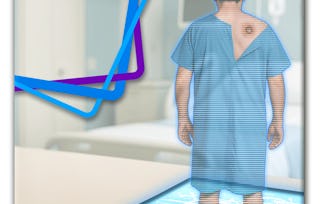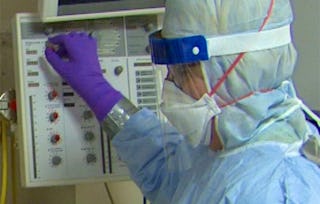Learn about the role of environment in disease transmission and how to implement standard and transmission-based precautions to prevent the spread of antibiotic resistant bacteria and other infections in your facility.

Infection Prevention in Nursing Homes

1,151 reviews
Details to know

Add to your LinkedIn profile
6 assignments
See how employees at top companies are mastering in-demand skills

There are 6 modules in this course
Standard Precautions are the foundation for preventing the spread of infectious agents. Sometimes conditions require the addition of Transmission-based Precautions. In this module, we will review Standard Precautions and describe four transmission-based precaution categories.
What's included
2 videos1 assignment
In the 70 years since the first antibiotics where developed to treat common bacterial infections, resistance to these “wonder” drugs has increased due to overuse and misuse. This has led to the rise of "super-bugs" or “multi-drug resistant organisms” that are not treatable by any antibiotic. If not addressed, antibiotic resistance will result in people dying from simple bacterial infections. This module will describe multi-drug resistant organisms, how they affect the residents in your facility, and what you can do to help control their spread.
What's included
1 video1 assignment
Unsafe injection practices have led to large outbreaks of bloodborne pathogens. It is critical that best practices for safe injections and blood glucose monitoring are followed without exception. We will look at factors that contribute to the misuse of injection equipment, and a special program health care personnel can utilize to address this problem: the One and Only Campaign.
What's included
1 video1 assignment
Until recently, the role of the environment in disease transmission has been thought to be insignificant. Recent studies have shown that several major pathogens, like MRSA, VRE, C. difficile and norovirus, are shed by colonized and infected residents and contaminate surfaces at levels sufficient for disease transmission. This module will examine best practices for cleaning and disinfection.
What's included
1 video1 assignment
This module you will learn about the risk of urinary tract infections (UTIs) among nursing home residents and prevention strategies for helping residents stay healthy and UTI free.
What's included
1 video1 assignment
Preventing Clostridium difficile infection and transmission continues to represent a serious challenge in infection prevention and nursing home resident safety. In this module, you will learn about how C. difficile is spread and best practices for preventing the spread of the germ in your facility.
What's included
1 video1 assignment
Instructor

Explore more from Public Health
 Status: Free Trial
Status: Free Trial Status: Preview
Status: PreviewUniversity of Nebraska
 Status: Preview
Status: PreviewUniversity of Leeds
 Status: Free Trial
Status: Free TrialLecturio
Why people choose Coursera for their career

Felipe M.

Jennifer J.

Larry W.

Chaitanya A.
Learner reviews
- 5 stars
86.09%
- 4 stars
11.55%
- 3 stars
1.56%
- 2 stars
0.34%
- 1 star
0.43%
Showing 3 of 1151
Reviewed on Jun 18, 2020
An absolutely superb course that is extremely interesting, informative and educational with lots of great lectures and fun acters.
Reviewed on Nov 11, 2024
Playful and compact course with practical information, great as a reminder about importance of our role in infection prevention.
Reviewed on May 26, 2020
IT WAS INTERESTING TO GET MY SKILL , QUALIFICATION, AND TRAINING WITH COURSERA,I AM VERY HAPPY AND RECOMMENDED ANYONE WHO wants TO JOIN WITH COURSERA, THIS COURSE HAS HIGH MOTIVATION

Open new doors with Coursera Plus
Unlimited access to 10,000+ world-class courses, hands-on projects, and job-ready certificate programs - all included in your subscription
Advance your career with an online degree
Earn a degree from world-class universities - 100% online
Join over 3,400 global companies that choose Coursera for Business
Upskill your employees to excel in the digital economy
Frequently asked questions
To access the course materials, assignments and to earn a Certificate, you will need to purchase the Certificate experience when you enroll in a course. You can try a Free Trial instead, or apply for Financial Aid. The course may offer 'Full Course, No Certificate' instead. This option lets you see all course materials, submit required assessments, and get a final grade. This also means that you will not be able to purchase a Certificate experience.
When you purchase a Certificate you get access to all course materials, including graded assignments. Upon completing the course, your electronic Certificate will be added to your Accomplishments page - from there, you can print your Certificate or add it to your LinkedIn profile.
Yes. In select learning programs, you can apply for financial aid or a scholarship if you can’t afford the enrollment fee. If fin aid or scholarship is available for your learning program selection, you’ll find a link to apply on the description page.
More questions
Financial aid available,

